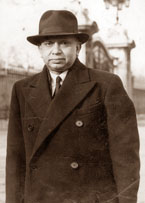|
dailynews |
|
|
|
|
|
OTHER LINKS |

|

|

|
Oliver Goonetilleke, greatest son of post colonial Sri LankaREMEMBERED: October 20 marks the 114th birth anniversary of former Governor General of Sri Lanka, Sir Oliver Goonetilleke, arguably the greatest son of Lanka since the advent of the Europeans into the country. OEG was known affectionately as Oliver by the citizens of his time and by their highnesses and excellencies around the world who shook his hand. According to "Dr Evatt of Australia" Oliver was one of the five greatest brains in the Commonwealth.
Like most great men, in the spring of his life he counted failures, one being his quest to become a doctor. So, to eke out the family resources and continue his studies he worked as a teacher at Wesley College. He entered the London external BSc degree which he obtained in 1916 at the age of 24. In July 1921 Oliver took on the job of manager of the Ceylon Daily News, controlled by a notable journalist, D R Wijewardena, but soon he left, to take on the post of auditor in the government railway. Meanwhile, in 1920 Oliver had married a cousin Esther Beatrice Jayawardena, who hailed from a prominent family. The young couple set up their home in a house belonging to Esther named "Evaldon" in Castle Street, Colombo. Their daughter Joye continues to enjoy long life, having married an engineer, Mallory Wijesinge. Near Evaldon was a house called Woodlands whose chief occupant, D S Senanayake was already known in his efforts to gain self-government for his country. D S introduced Oliver to the Exclusive Orient Club. Soon, Oliver became secretary of the club, having asked the hot-blooded D S to resign from his post. Friendship was his main investment in life, Oliver had written. There was no wish on the part of Oliver or those closest to him to break away from Britain. What he wanted was to make Ceylon, like Britain, a free, self-governing parliamentary democracy run by the Ceylonese for the Ceylonese as a member of the British family of nations. In 1926, Oliver paid his first visit to England. Having been denied in youth the chance of his wealthier contemporaries of obtaining higher education in Britain - Oliver attended a post-graduate course in economics at the London School of Economics and Political Science. In December 1941 the otherwise peaceful nature of wartime Ceylon took a dramatic change with the entry of Japan into World War II. A Civil Defence Department was formed and Governor Sir Andrew Caldecott invited Goonetilleke to take charge of it. As the Japanese swept though Indonesia and Malaysia it was a real probability that Ceylon would be an early objective. The British Government appointment Sir Geoffrey Layton as Commander-in-Chief of Ceylon and Oliver as Civil Defence Commissioner. Four days after the attack on Colombo the Japanese attacked Trincomalee and the damage to British shipping was greater this time. Of 54 planes, the Japanese lost 14. The Japanese had enough of Ceylon and never followed up the raids. There was a shortage of food and rice was coming from Burma. It was natural that Goonetilleke should be appointed Food Commissioner while D S Senanayake was Minister of Food and Agriculture. In the King's Birthday Honours list of 1944 Oliver Goonetilleke was made a Knight Commander of the Order of the British Empire. Sir Oliver, Financial Secretary of Ceylon chalked up another first becoming the first Ceylonese Officer of State. As financial Secretary he was an official member of the Board of Ministers; and as senior civil servant, he was responsible to the Governor. At the same time he seemed to be in intimate contact with D S; it was a delicate position but he contrived to walk the tight-rope without putting a foot wrong. The speed at which Sri Lanka obtained independence and without bloodshed belongs to the genius of Oliver. D. S Senanayake's first reaction to the British government's statement of policy was to reject the terms offered. Goonetilleke's instinct was that the right thing to do was to accept what was offered and in time exert further pressure in an atmosphere and goodwill. The deal had been struck for self Government. From the actual obtaining of independence to the state of emergency declared in Ceylon in 1958, Sir Oliver Goonetilleke played his crucial part, with tact and cunning. However, may it suffice to say that the renowned cartoonist of the day, Aubrey Collette, often referred to Oliver as the Wise Old Owl and drew him that way. From Collette's pen flowed: A Wise Old Owl lived in an oak, The more he saw the less he spoke. The less he spoke the more he heard; Why can't I be like that wise old bird? With dignity and sorrow, he quietly left Ceylon on March 7, 1962, having first answered all the questions anybody wanted to be put to him in connection with the proposed coup d'etat. As was to be expected, these interrogations failed to reveal that he had any contact with or knowledge of the plot; and when, eventually, the conspirators were tried and sentenced, the Supreme Court judgement effectively cleared Sri Oliver of having had any complicity. Olive, like Abraham Lincoln did a great service to a young nation. Both left in sorrow. Abe is revered. Oliver would also smile if there is gratitude in remembrance, from his people. |








